This year, when homeowners consider investing in landscaping projects, many questions flood their minds. What is the average cost of landscaping around a house? How much does landscaping cost per square foot? And what do most landscapers charge per hour? With factors like the cost of landscaping the front yard differing from that of the backyard, understanding the nuances is essential.
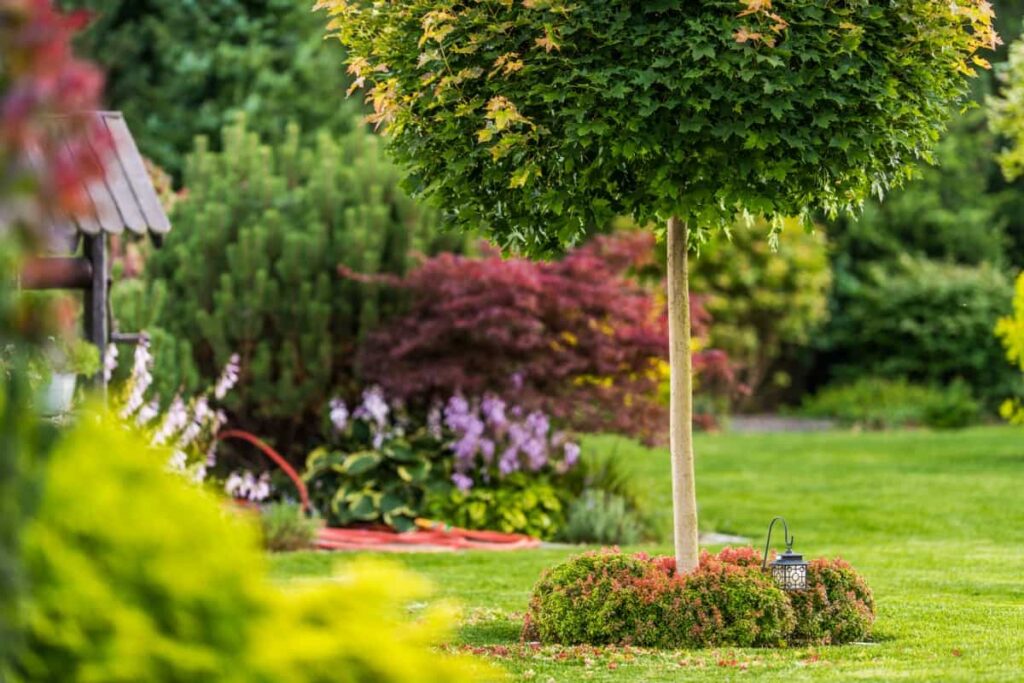
Introducing tools like the landscaping cost calculator has simplified the process for many. Yet, gaining a comprehensive insight into the average landscaping cost per hour, landscaping cost per acre, and even the average cost of landscaping maintenance is crucial for budgeting. Intending to address these concerns, this article delves deep into the intricate world of landscaping costs.
How Much Does Landscaping Cost
Understanding the Factors Affecting Landscaping Costs: A Comprehensive Analysis
Several elements play a pivotal role in determining the overall landscaping expenses. The complexity and design of the project top the list, followed closely by the choice of plants, trees, and materials. Labor expenses may fluctuate based on your location and the skills of the professionals you employ.
Additionally, regional pricing differences and the specific requirements of the soil can significantly influence the budget. It’s also noteworthy that while some homeowners might opt for DIY landscaping to cut costs, hiring professionals can provide a polished and sustainable result, even though the initial investment might be higher.
Exploring the Average Square Foot Rates for Backyard Landscaping Projects
The backyard is a personal haven for many, making it a focal point for landscaping endeavors. On average, backyard landscaping costs from $5 to $20 per square foot. The rate disparity can be attributed to the choice between basic designs, like a simple lawn with some shrubs, versus intricate layouts featuring patios, walkways, or water features. Adding elements such as outdoor kitchens or fire pits can further inflate the cost. Moreover, the types of plants chosen, from basic grasses to exotic flowers, can also create variations in pricing.
In case you missed it: The 15 Best Lawn Sprinklers for Large and Small Areas: Cheap and Top Quality
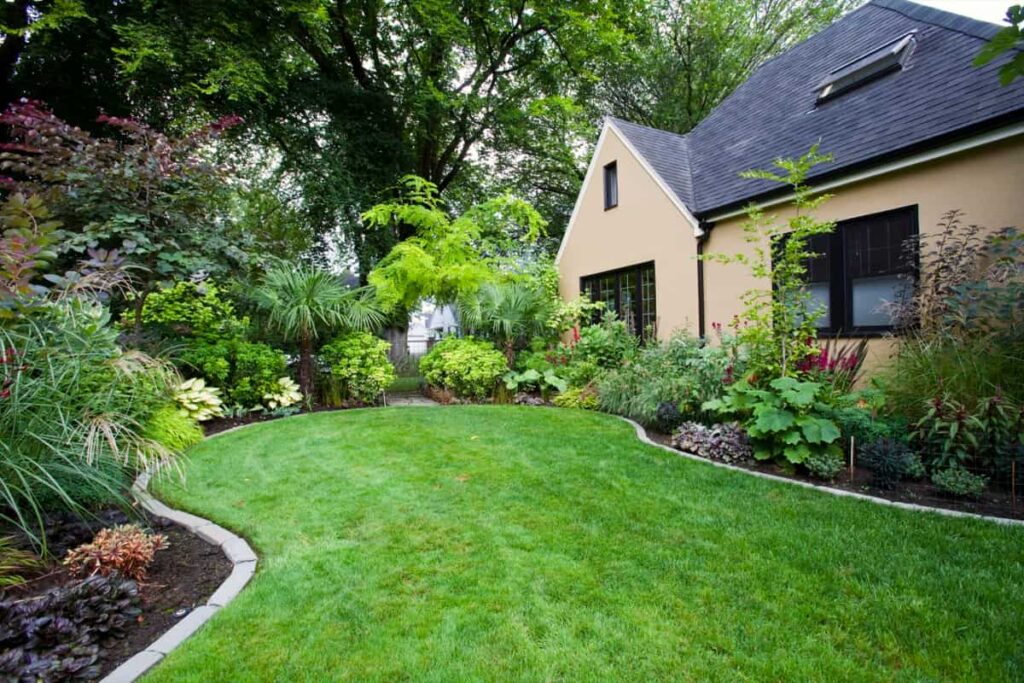
Front Yard Landscaping Costs: What to Expect in Terms of Square Foot Rates
The front yard is the first impression of a home and often demands meticulous planning. The front yard’s landscaping typically costs between $4 to $15 per square foot. Basic landscaping, involving a neat lawn and a few decorative plants, will be on the lower end of the spectrum. On the other hand, elaborate designs with pathways, decorative rocks, or water features can push costs higher. Lighting, a popular addition to front yards for aesthetics and safety, can also affect the total expenditure.
The Impact of Yard Size on Landscaping Costs: Small vs. Large Yards
Given the increase in materials and labor, it’s logical to assume that a larger yard would entail higher costs. However, the per-square-foot rate might decrease with the increase in total area, offering a “bulk discount”. Small yards, with an area under 1,000 sq. ft., might have a slightly higher per-square-foot rate due to the concentration of designs in a limited space.
On the other hand, landscaping cost per acre could be less per square-foot for expansive properties, but the overall outlay will be substantially more. Another key aspect is maintenance. Given the vastness and potential complexity, the average cost of landscaping maintenance for larger yards will inherently be higher. Yet, regular maintenance ensures that initial investments in landscaping remain worthwhile and the yard continues to shine in all its green glory.
Examining the Role of Design Complexity in Landscaping Pricing
Design complexity undeniably stands as a major determinant in the overall cost of a landscaping project. Basic designs, characterized by simple lawns and a few plant selections, tend to be budget-friendly. However, the pricing escalates as homeowners opt for intricate layouts, incorporating features such as waterfalls, multilevel terraces, or themed gardens.
The labor involved in executing complex designs is intensive, necessitating expertise and prolonged work hours. Furthermore, intricate designs often demand specialized materials and tools, further driving up costs. Homeowners must balance their aesthetic aspirations and budget constraints, understanding that the more complex the design, the steeper the price tag.
Materials and Plant Selection: How They Influence Landscaping Expenses
The choice of materials and plants is pivotal in the overall landscaping budget. Opting for indigenous plants, which are acclimated to the local soil and climate, can be cost-effective as they often demand less maintenance and have a higher survival rate. Conversely, while aesthetically pleasing, exotic plants might require specialized care and be pricier to source.
In case you missed it: Lawn Irrigation System Cost: Estimating Cost Per Square Foot for Different Types
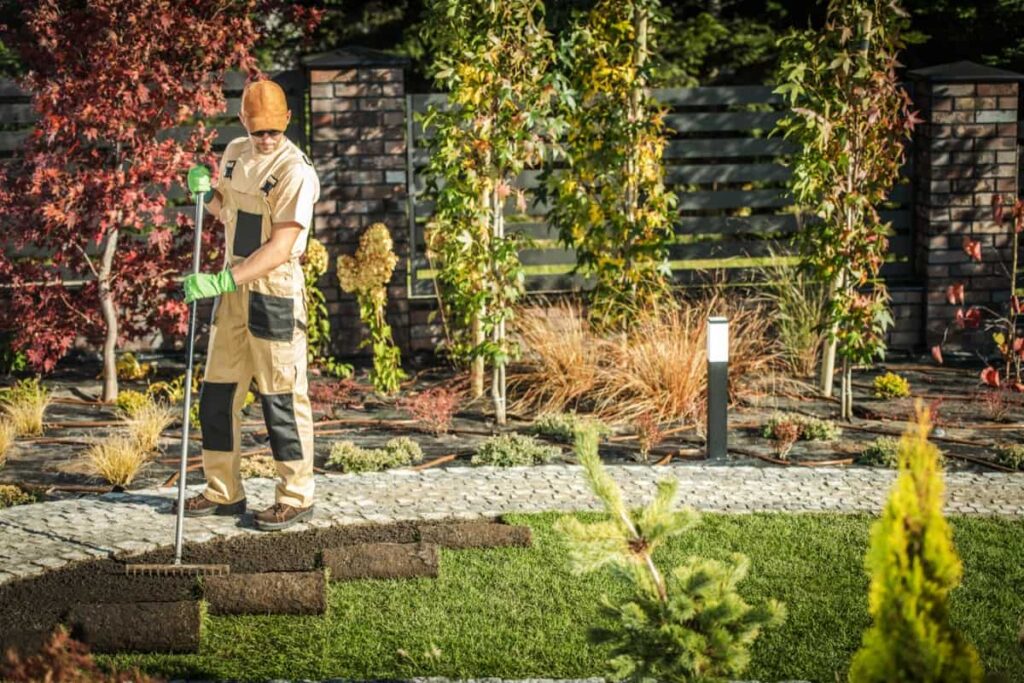
Regarding materials, choices range from standard mulch and basic stones to premium marbles and imported tiles. The quality and rarity of materials directly impact the cost. The durability of chosen materials should also be considered, as long-term expenses can arise from the frequent replacement of subpar selections.
Hardscaping vs. Softscaping: Comparing Costs and Benefits
When discussing landscaping, the concepts of hardscaping and softscaping invariably arise. Hardscaping includes things like patios, walkways, and walls in landscaping, but it’s not living stuff. These often demand substantial investments, both in terms of materials and labor. Softscaping, on the other hand, involves living elements like plants, trees, and shrubs. While softscaping generally involves a lower initial cost compared to hardscaping, it brings recurring maintenance expenses.
The benefits of each vary; hardscaping offers lasting structures that can enhance functionality and aesthetics, while softscaping breathes life into the yard, providing a dynamic environment that changes with the seasons. Regarding cost, the choice between hardscaping and softscaping should align with the homeowner’s long-term vision and financial preparedness.
The Importance of Site Preparation in Determining Landscaping Prices
Before the first plant is planted or the first stone laid, site preparation stands as a precursor to any landscaping project. This phase involves soil testing, grading, and potential debris removal. The nature of the site, whether it’s rocky, sloping, or swampy, can influence the preparatory work required.
Sites demanding extensive preparation can increase costs, as they might need machinery hire or additional labor hours. Furthermore, a well-prepared site ensures the longevity of the landscaping efforts, making it a non-negotiable step in the process. Although cutting corners during this phase might be tempting to save costs, inadequate site preparation can lead to escalated expenses in the long run due to potential damages or the need for rework.
Understanding the Labor and Installation Costs Involved in Landscaping Projects
Labor and installation are some of the most significant components of the total cost when undertaking a landscaping project. The expertise and experience of the landscaping professionals directly influence the hourly or project-based rates they command. Typically, specialized tasks, such as installing water features or laying intricate stone pathways, demand higher labor costs due to the skills involved.
In case you missed it: 15 Best Weed Killers for Lawns: Homemade and Prices for Commercial Concentrates
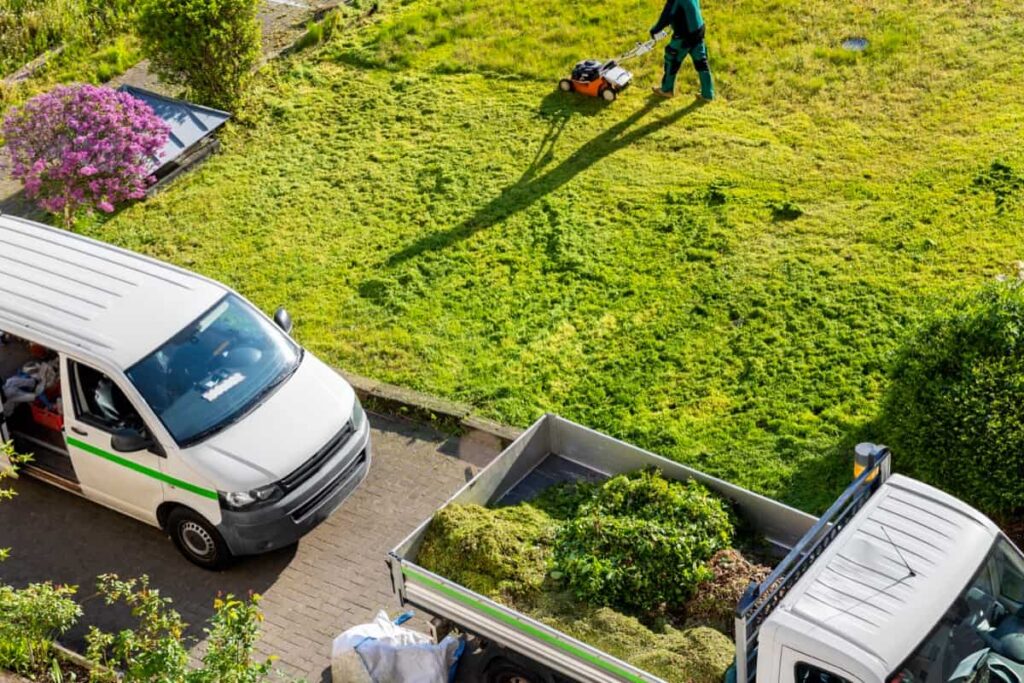
Additionally, the project duration plays a role, with prolonged projects requiring a greater labor budget. It’s also essential to note that while DIY landscaping might seem like a cost-saving option, the lack of professional expertise can lead to mistakes and potential future expenses for corrections. Hence, homeowners should consider the long-term benefits of investing in experienced professionals who can ensure quality and durability while evaluating labor and installation costs.
Additional Features and Enhancements: Their Effect on Landscaping Budgets
Landscaping is not merely about plants and lawns; adding additional features and enhancements can substantially amplify the aesthetics and functionality of a space. Features like outdoor lighting, pergolas, fountains, and fire pits can transform a basic garden into a luxurious retreat.
However, with these enhancements come increased costs. The materials required for these features and the specialized labor to install them can quickly escalate the overall budget. Furthermore, certain enhancements might demand electrical or plumbing work, introducing another layer of expense. While these features undeniably elevate the charm and utility of the landscape, homeowners should integrate them judiciously, weighing the benefits against the financial implications.
The Role of Maintenance and Upkeep in Long-Term Landscaping Expenses
While the initial installation of a landscape is a significant investment, the role of maintenance and upkeep in the long term cannot be overlooked. Plants require regular watering, pruning, and fertilization to thrive. Features like ponds or fountains might need periodic cleaning and servicing.
Even hardscaped areas, such as patios or decks, demand occasional repairs or sealant applications. Over time, these maintenance tasks, whether outsourced to professionals or undertaken personally, accumulate into substantial expenses. Ignoring regular upkeep can lead to the deterioration of the landscape, nullifying the initial investment. Thus, when budgeting for landscaping, it’s vital to factor in the recurrent maintenance costs to ensure the space’s sustained beauty and health.
Regional Variations in Landscaping Costs: Factors to Consider
The landscaping cost isn’t uniform across regions; several factors introduce expense variability. The local cost of living is a primary determinant, influencing both material and labor rates. The availability of plants and landscaping materials in a particular region can also sway costs. For instance, sourcing exotic plants in an area where they’re not indigenous can introduce additional transportation and care expenses.
In case you missed it: 12 Garden Watering System Kits – For Raised Garden Beds, Yards, Container Plants, Lawns, and Greenhouse
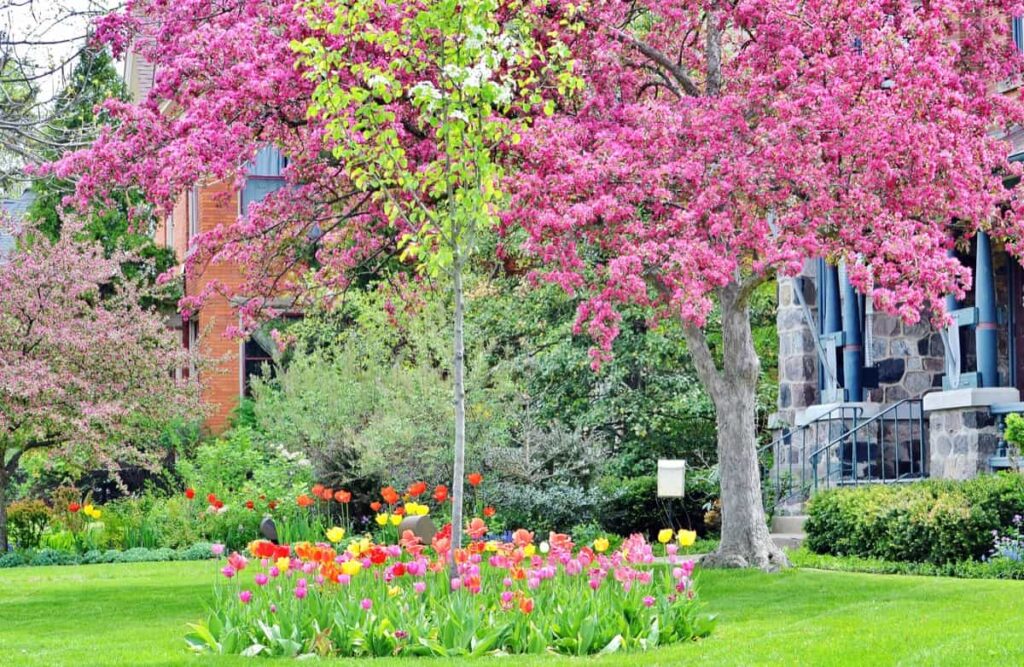
Climate plays a role, too; certain landscapes are more expensive to maintain in regions with extreme weather conditions due to the need for specialized care or frequent replacements. Furthermore, regional regulations or licensing requirements for landscaping professionals can also affect pricing. Homeowners must research and understand these regional nuances to budget accurately and set realistic expectations for their landscaping projects.
Evaluating the Cost-Effectiveness of DIY vs. Professional Landscaping
Embarking on a DIY landscaping venture can seem enticing, especially considering the potential labor cost savings. DIY projects offer homeowners the flexibility to work at their own pace and make modifications as they deem fit. Moreover, the personal touch and sense of accomplishment attached to a self-executed project can be unparalleled. However, the financial allure of DIY might be misleading.
Without professional knowledge, homeowners are prone to mistakes in material choice, installation techniques, or design intricacies. Such errors can lead to additional costs in rectifications. On the other hand, professional landscapers bring expertise, ensuring the job is done right the first time. They can also access materials at discounted rates, have the right tools for the job, and often provide warranties on their work. Thus, while the upfront costs might be higher with professionals, the long-term cost-effectiveness often tilts in their favor.
Hidden Costs and Unexpected Expenses in Landscaping Projects
Regardless of its scope, every landscaping project comes with its set of anticipated expenses. However, hidden costs and unexpected expenditures often throw off the initial budgeting. These can arise from unforeseen site challenges like rocky terrain or poor soil quality, necessitating additional preparation or material. Mid-project design changes or enhancements, too, can inflate the budget.
There might also be costs associated with permits or approvals, which homeowners might overlook in their initial calculations. Unexpected weather delays can prolong the project, leading to increased labor costs. Homeowners must be prepared for such contingencies, ideally setting aside 10-20% of the projected budget to accommodate unforeseen expenses.
Tips for Budgeting and Planning Your Landscape Design Project
Budgeting and planning are the bedrock of a successful landscaping project. Begin by setting a clear vision for the project and outlining priorities. Research and gather quotes from multiple professionals to grasp the market rates. Utilize landscaping cost calculators to get ballpark figures for various aspects.
Always account for seasonal changes; certain plants or materials might be cheaper during off-peak times. Think long-term; invest in quality materials that offer durability rather than opting for cheaper alternatives that might incur more maintenance. Engage openly with your landscaper, setting clear expectations and budget constraints. Lastly, as previously mentioned, always keep a contingency fund to address unforeseen costs, ensuring the project doesn’t stall due to budgetary surprises.
In case you missed it: The 19 Best Garden Sprayers for Your Home Garden, Patio, and Lawn within your Budget
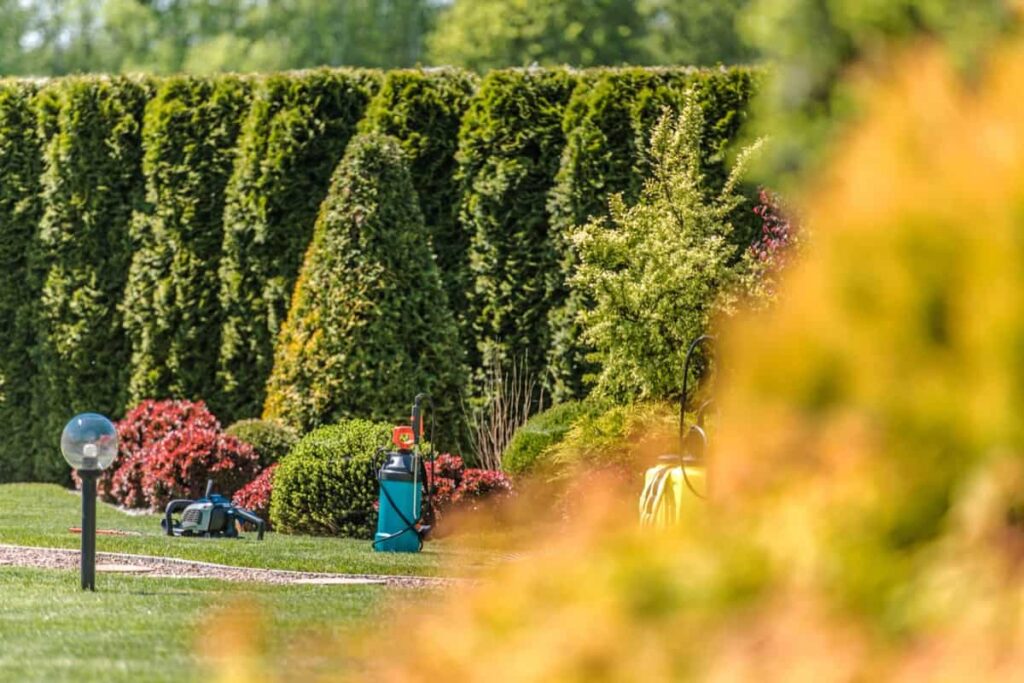
Landscaping Cost for Square Foot Rates and Prices For Backyard and Front Yard
| Project Type | Basic Design | Intermediate Design | Advanced Design |
| Backyard Landscaping Cost per Square Foot | |||
| Lawn Installation | $1 – $2 | $3 – $4 | $5 – $6 |
| Plant Beds (including plants) | $3 – $5 | $6 – $8 | $9 – $11 |
| Patio or Deck | $5 – $7 | $8 – $12 | $13 – $18 |
| Outdoor Features (like kitchens and fire pits) | $10 – $15 | $16 – $20 | $21 – $30 |
| Front Yard Landscaping Cost per Square Foot | |||
| Lawn Installation | $1 – $2 | $2 – $3 | $4 – $5 |
| Plant Beds (including plants) | $2 – $4 | $5 – $7 | $8 – $10 |
| Walkways & Driveways | $5 – $10 | $11 – $15 | $16 – $20 |
| Water Features & Fountains | $15 – $20 | $21 – $25 | $26 – $35 |
Conclusion
Navigating landscaping costs requires understanding varying design complexities and their respective pricing. Homeowners can achieve a harmonious blend of aesthetics and budgetary prudence by meticulously planning and referencing reliable estimates.
- How to Raise Pigs in Your Own Backyard: A Comprehensive Guide
- Budget Friendly Sheep Shed Ideas: Cheap and Low-Cost Tips
- How Much Do Cattle Farmers Make: Revenue Streams in Cattle Farming
- Management Pests and Diseases in Your Cotton Field
- Sheep Farming Business Plan for Beginners
- Aquaponic Farming at Home: A Step-By-Step Guide
- Profitable Village Farming Business Ideas in 2024
- High-Yield Aquaculture: Fast-Growing Fish for Farming
- Effective Fish Pond Construction Techniques for Beginners
- Irrigation and Water Management in Pineapple Farming
- Blossom to Harvest: Mastering Flowering and Pollination in Papaya Farming
- Pig Fattening Essentials: From Selection to Sale for Beginners
- Raising Wagyu Cattle: A Complete Guide for Premium Beef Production
- Soil Types and Their Water Holding Capacity
- Optimizing Irrigation Schedules for Coconut Groves for Enhanced Yield
- Espresso Your Garden: Coffee Grounds for Healthier Acid-Loving Plants
- The Best Soil Mix for Snake Plants: How to Mix Your Own Snake Plant Soil
- Green Thumb Success: Expert Tips for Cultivating Greenhouse Beans All Year Round
- Bloom All Year Round: The Ultimate Guide to Indoor Hyacinth Care
- Eco-Friendly Gardening: How to Make Liquid Fertilizer from Kitchen Waste
- Ultimate Guide to Grow Anise in Pots: Explore Seed Propagation to Harvesting
- Guide to Raising Chester White Pigs: Discover Breed Facts to Growth Management
- Mastering the Elegance: The Ultimate Guide to Weeping Cherry Tree Care, Planting, and Maintenance
- Ultimate Guide to Planting Garlic in Grow Bags: Growing Strategies for Beginners
- How to Fix Spider Plant Leaf-Related Problems: Natural and Organic Remedies
- 10 Reasons Why Your Tulsi Plant is Shedding Leaves: Home Remedies and Solutions
- Optimizing Growth and Yield: The Advantages of Palm Bunch Ash Fertilizer
- Utilizing Neem Oil Extract as a Natural Pesticide for Hydrangea
- From Soil to Harvest: Various Ways in Which Farmers Can Use AI Tools
- Steps to Encourage and Induce Citrus Flowers: A Comprehensive Guide
- How to Fix Snake Plant Leaf-Related Issues: Natural and Organic Remedies
- Transform Your Garden into a Fragrant Oasis with Raat Ki Rani (Night Blooming Jasmine)
- Discover the Ideal Chicken Breeds for Philippine Farms
- How to Create a Poultry Egg Farm Business Plan for Profits
- Grow Lemon Cucumbers Like a Pro: Insider Techniques for Bountiful Yields
- Ultimate Guide to Caring for Your Pink Princess Philodendron: Tips for Thriving Variegation
